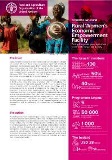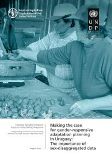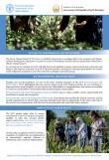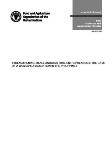Publications

Maldives: Country gender assessment of agriculture and the rural sector (Country Gender Assessment Series)
16/10/2019
This assessment provides evidence of gender inequalities in the agriculture and rural sectors of Maldives, highlighting rural women’s needs, challenges and priorities. It also analyses country-level achievements, and shortfalls in closing existing gaps towards the pursuit of gender equality. It also provides data on facilitating women’s empowerment and their access to resources and opportunities. 46 pp.

Rural Women’s Economic Empowerment Facility
06/10/2019
Gender-based socioeconomic inequalities are preventing rural women from sustaining and improving their livelihoods. Gender disparities in food security are due to unequal access to resources, services and economic opportunities. Studies show that ensuring women’s equitable access to economic resources and opportunities boosts productivity, bolstering prosperity, food security and economic growth. 2 pp.

Indonesia: Country Gender Assessment of agriculture and the rural sector (Country Gender Assessment Series)
01/09/2019
This assessment analyzes the agricultural and rural sector of Indonesia from a gender perspective at the macro (policy), meso (institutional) and micro (community and household) levels in order to identify gender inequalities in access to critical productive resources, assets, services and opportunities. It identifies the needs and constraints of both women and men in selected FAO areas of competence, as well as identifying priorities and gaps. 67 pp.

Making the case for gender-responsive adaptation planning in Uruguay: The importance of sex-disaggregated data
01/08/2019
This case study shares Uruguay’s recent experiences collecting and analyzing sex-disaggregated data relevant to adaptation planning in the agriculture sectors. It describes the findings from a qualitative and quantitative study that aimed to generate information about resources as well as symbolic, cultural, and economic barriers affecting adaptation in agricultural production from a gender perspective. 18 pp.

Minimum Dietary Diversity for Women
19/07/2019
Promoting diverse diets is key to improving nutrition of women of reproductive age and can support the achievement of the Sustainable Development Goals and the World Health Assembly global nutrition targets for 2030. 2pp.

Gender, Environmental and Social Policy of the Green Climate Fund
14/07/2019
The Green Climate Fund (GCF) gender policy aims to ensure contribution of the GCF projects to gender equality, to take into account gender aspects, and, in turn, mainstreaming of gender and social factors make climate events more effective, sustainable and efficient. 2 pp.

Gender Asia Pacific Newsletter, July 2019 - Issue #2 Gender-Responsive Social Protection
01/07/2019
This publication showcases FAO’s gender-related work at country and regional levels thus contributing to FAO’s strategic objective 6 – Technical quality, knowledge and services. 8 pp.

Strengthening small aquaculture entrepreneurs: the case of a women’s association in the Philippines
28/06/2019
On the basis of interviews, farm visits and data collection, this study identifies the factors that enabled a small farmers’ association to become more effective in the value chain of their products, including through stronger partnerships with buyers and suppliers. 28 pp.
